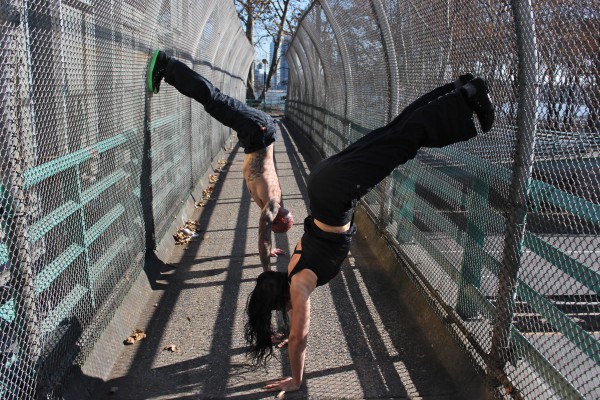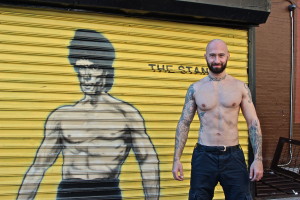
Al Kavadlo and Adrienne Harvey ‘Overcoming Gravity’ with Bodyweight Strength
My name is Steven Low, author of Overcoming Gravity: A Systematic Approach to Gymnastics and Bodyweight Strength. I will be one of the senior PCC’s in June.
As I am sure you are all aware, I am just one author on the subject of bodyweight strength training. Paul Wade, Al Kavadlo, and others have written various articles and books on bodyweight strength training and have developed their own systems. Many of those looking to learn about bodyweight strength training have told me that they have a lot of the different book materials from a variety of the listed authors.
Thus, one of the questions that many people ask me is – what is the best program?
To answer this question let me give you some more of my thoughts on the bodyweight strength communities.
I personally do not think that the market of bodyweight strength books, DVDs, and online material is a competition. Everyone has their own take on exercises and programming methods which work. The key point is that the best program is the one that you will stick with to make progress. Any experienced trainer will tell you flat out that this is the truth.
Essentially, the best “program” is whatever helps you progress towards your goals whether it be Overcoming Gravity, Convict Conditioning, Raising the Bar, or other training methods.
One of the main criticisms of my book is that it has almost to much information, especially for newer people looking to get into bodyweight training. I completely agree. Learning how to train and construct routines can be a daunting task for a person new and interested in bodyweight strength training.
One of the terms we like to use in fitness is paralysis by analysis. If there’s too much information, it’s very hard to sift through it. This goes along with the concept that the best program is the one you will stick to.
There is no such thing as a perfect routine. There’s many reasons why this is true.
- All systems have their positives and negatives with regard to sets, repetitions, volumes, frequency, etc. Not everyone responds the same to the same program.
- Everyone is coming from a different athletic background or even none at all. A sedentary person is different from someone who has performed gymnastics – who is different from someone who played basketball.
- Programming should vary depending on the level of ability you are at. You don’t train a beginner with the volume of an elite athlete. If you throw 40 hours of gymnastics or any other sport at at a new person they would get injured within the first week.
- Previous injury history plays an important role as well as potential dysfunctions that people have that are not injuries. The highest predictor of injury is a previous injury. This tells me that someone who has had previous back or shoulder pain may have different needs than your typical average healthy person. Additionally, a desk job worker with poor posture may not respond well to specific training until their dysfunctional posture has been fixed.

Different people have different training needs.
Essentially, all good training materials have ways of getting people started. The three key variables that are involved with a good starting program are:
- Focused towards your goals, and
- Made in a such a way that keeps you injury free, and
- Made such that you will stick to the program.
Get rid of all of the analysis. You will essentially learn as you train. In any sport or discipline you need to know how to do things – that is what the books and training materials are for. The other component that is often left out for many is that you actually have to put those things into practice as well. You cannot have one without the other.
Focus a program towards your goals, listen to your body, and train!
***
About Steven: Steven Low, author of Overcoming Gravity: A Systematic Approach to Gymnastics and Bodyweight Strength, is a former competitive gymnast who, in recent years, has been heavily involved in the gymnastics performance troupe, Gymkana. With his degree from the University of Maryland College Park in Biochemistry, Steven has spent thousands of hours independently researching the scientific foundations of health, fitness and nutrition. Currently Steven is pursuing a doctorate of Physical Therapy from the University of Maryland Baltimore which provides him with insights into practical care for common injuries. His training is varied and intense with a focus on gymnastics, parkour, rock climbing, and sprinting. He currently resides in his home state of Maryland. His website is http://eatmoveimprove.com.